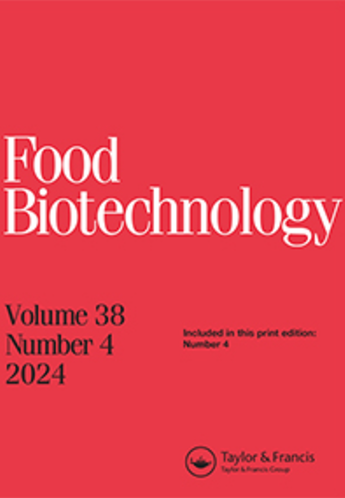油桃果实低温贮藏响应的转录分析
IF 1.6
4区 农林科学
Q4 BIOTECHNOLOGY & APPLIED MICROBIOLOGY
引用次数: 1
摘要
蜜桃是一种亚热带果树,具有较强的抗寒性。本研究以曙光油桃果肉为材料,测定了其贮藏过程中冷害前后转录数据的差异。此外,还探讨了油桃对冷胁迫适应的基因反应。目前的研究结果表明,油桃在5°C储存期间比在0°C储存时更容易受到冷害,差异表达基因(DEGs)集中在低温储存的后期,实验结束时出现冷害症状。与低温反应相关的关键基因与收获后的生物过程有关。DEGs被注释在抗寒调节信号转导、抗寒生理代谢和抗寒相关蛋白合成的代谢途径上。此外,与冷胁迫相关的基因如植物激素信号转导元件如生长素反应蛋白的表达,响应冷胁迫的转录因子如WRKY转录因子和与维持膜稳定性和调节生理代谢相关的基因如脯氨酸脱氢酶在油桃储存于5°C时比在0°C时更显著。总之,这些发现表明,在油桃的低温贮藏过程中,低温的变化对与抗寒途径相关的转录水平有很大影响,从而促进油桃的冷害障碍。本文章由计算机程序翻译,如有差异,请以英文原文为准。
Transcriptional analysis of the response of nectarine fruit to low-temperature stress in cold storage
ABSTRACT Nectarine (Prunus persica var. nectarina) is a sub-tropical fruit tree with strong cold sensitivity. In this study, flesh of nectarine (Shuguang) was used to determine the difference in transcriptional data before and after chilling injury under storage. In addition, genes responses involved in nectarine acclimation to cold stress were also explored. Results of the current study showed that nectarine was found to be more susceptible to chilling injury during storage at 5°C than at 0°C, and differentially expressed genes (DEGs) were concentrated in the late stage of low-temperature storage where chilling injury symptoms appeared at the end of the experiment. The key genes related to low-temperature response were associated with post-harvest biological processes. DEGs were annotated on the metabolic pathways of cold regulation signal transduction, cold resistance physiological metabolism and cold resistance-related protein synthesis. Moreover, the expression of genes related to cold stress such as plant hormone signal transduction element such as Auxin-responsive protein, transcription factors responding to cold stress such as WRKY transcription factor and genes related to maintaining membrane stability and regulating physiological metabolism such as proline dehydrogenase was more pronounced when nectarine was stored at 5°C than at 0°C. Overall, these findings showed that alteration in chilling temperature has substantial impact on the transcription levels associated with cold resistance pathway during the low-temperature storage of nectarine and thus promotes chilling injury disorders in nectarine.
求助全文
通过发布文献求助,成功后即可免费获取论文全文。
去求助
来源期刊

Food Biotechnology
工程技术-生物工程与应用微生物
CiteScore
3.80
自引率
0.00%
发文量
15
审稿时长
>12 weeks
期刊介绍:
Food Biotechnology is an international, peer-reviewed journal that is focused on current and emerging developments and applications of modern genetics, enzymatic, metabolic and systems-based biochemical processes in food and food-related biological systems. The goal is to help produce and improve foods, food ingredients, and functional foods at the processing stage and beyond agricultural production.
Other areas of strong interest are microbial and fermentation-based metabolic processing to improve foods, food microbiomes for health, metabolic basis for food ingredients with health benefits, molecular and metabolic approaches to functional foods, and biochemical processes for food waste remediation. In addition, articles addressing the topics of modern molecular, metabolic and biochemical approaches to improving food safety and quality are also published.
Researchers in agriculture, food science and nutrition, including food and biotechnology consultants around the world will benefit from the research published in Food Biotechnology. The published research and reviews can be utilized to further educational and research programs and may also be applied to food quality and value added processing challenges, which are continuously evolving and expanding based upon the peer reviewed research conducted and published in the journal.
 求助内容:
求助内容: 应助结果提醒方式:
应助结果提醒方式:


